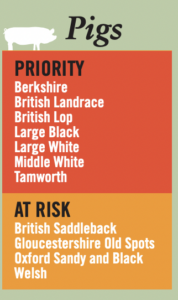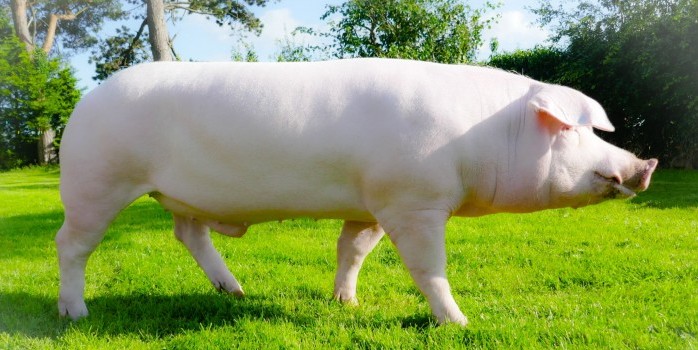The Rare Breeds Survival Trust (RBST) has warned that the future of the UK’s iconic native pig breeds is becoming increasingly insecure in the wake of the wider pig industry crisis.
RBST has today published its new RBST Watchlist, marking 50 years of the charity’s work to save and safeguard the future of rare and native livestock and equine breeds.
Worryingly, the British Landrace, which was already in the RBST Watchlist’s most urgent Priority category, saw a dramatic decline last year with just 23 dams producing pedigree progeny, down from 43 in 2021. This compares with 495 dams registered in 2006.

RBST pointed out that these very low numbers are in stark contrast to the 1970s, 80s and 90s when the British Landrace breed expanded rapidly to become one of the UK’s most popular breeds of commercial pig. Excellent for bacon production, the breed is the UK cousin of the European Landrace pigs which have long been very influential in the pork industry across the globe.
RBST highlighted other native pig breeds, which are cause for concern including:
- The British Saddleback pig, which is seeing a continued trend of falling numbers of registered animals.
- The Gloucestershire Old Spot pig, which now has the lowest number of breeders registering progeny since 2000.
- The Oxford Sandy & Black pig, which has seen the number of dams producing pedigree progeny fall 32% since 2020, and
- The Middle White, which has seen the number of dams producing registered progeny fall to its second lowest number since 2001.
There was better news on the Large White pig, however – an improvement in new birth registrations may indicate a stabilisation of this Priority breed’s previous downward trend, RBST said.
Pig industry crisis

RBST Chief Executive Christopher Price said: “Many of our native breeds of livestock are seeing renewed interest from farmers and smallholders as great breeds for modern times. They have been bred for UK landscapes and conditions so the right breed in the right place can mean lower costs for premium produce through environmentally sustainable, high welfare farming systems.
“However the crisis in the pig industry over the past two years is driving a very worrying and worsening situation for several of our rare native breeds.
“Fewer people are keeping these breeds now, and the number of new piglet births is falling too. Each of these breeds has unique characteristics – they are part of the UK’s heritage, but they also have an important role in food production today and the resilience of our pig industry into the future.
“We are asking Government to consider the urgent plight of native breeds as it reviews the pork supply chain.
He added that every single person who chooses native breed produce in a restaurant or at a butchers will be making a real contribution to saving these irreplaceable rare breeds, by supporting the farmers and smallholders working hard to keep and grow their rare breed herds.
“The British Landrace is in a particularly worrying situation,” he said. “It is a fantastic breed for really high-quality bacon and pork production, very easy to manage and excellent for improving other breeds of pig. But it is not as well-known as some of our other native pig breeds.”
He said RBST was working with the British Pig Association and the small but dedicated community of British Landrace keepers to make sure the breed’s excellent attributes aren’t overlooked, as well as ramping up support for conservation and breeding programmes.
Nigel Overend of Deerpark Pedigree Pigs in Northern Ireland, who keeps the Deerpark herd of British Landrace pigs which was started by his late father Robert Overend MBE in 1958 said: “The British Landrace is a special breed for my family, the Deerpark herd is our pride and joy.
“It’s a really economical, commercially viable native breed with a lot to offer modern farming and food production. Our herd’s genetics have improved bacon pigs all over the world, from Canada and Australia to Africa and the Falkland Islands, and ensuring the future of those unique pedigree British Landrace genetics is important for supporting food production as well as for the value of the breed in itself.”
Other struggling breeds
The RBST Watchlist highlighted a number of other breeds across the UK’s native livestock and equine breeds which are in growing need of support, including Llanwenog sheep, Castlemilk Moorit sheep, Gloucester cattle, Eriskay ponies and the Suffolk Horse:
High costs and avian flu restrictions are resulting in a reduction in rare poultry breeding programmes and some breeders are ceasing their programmes completely.




